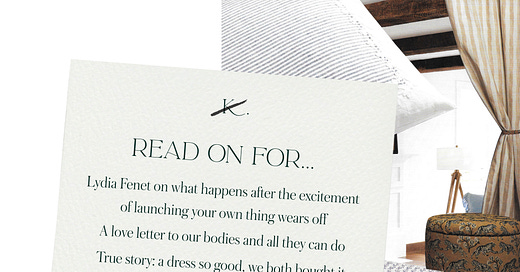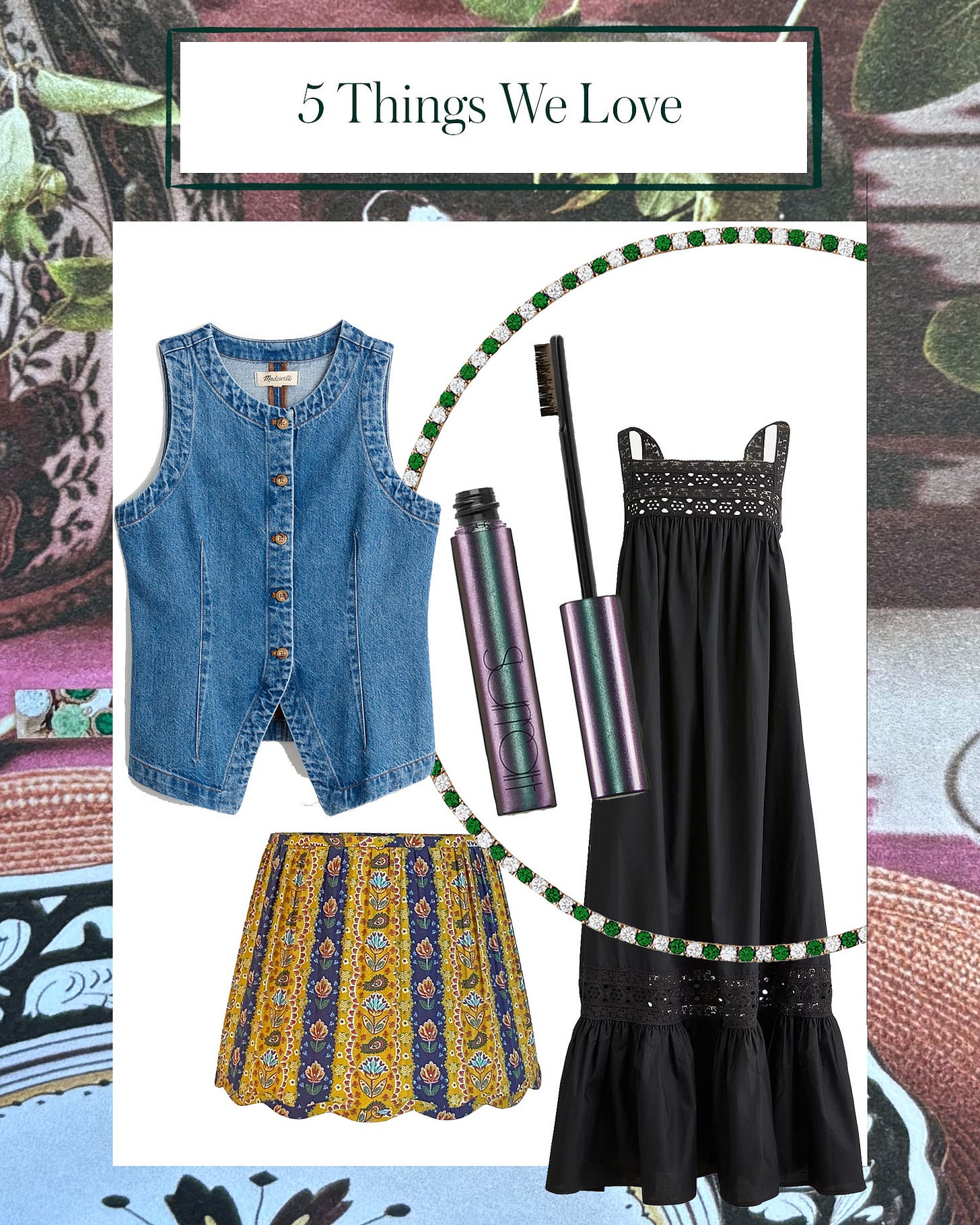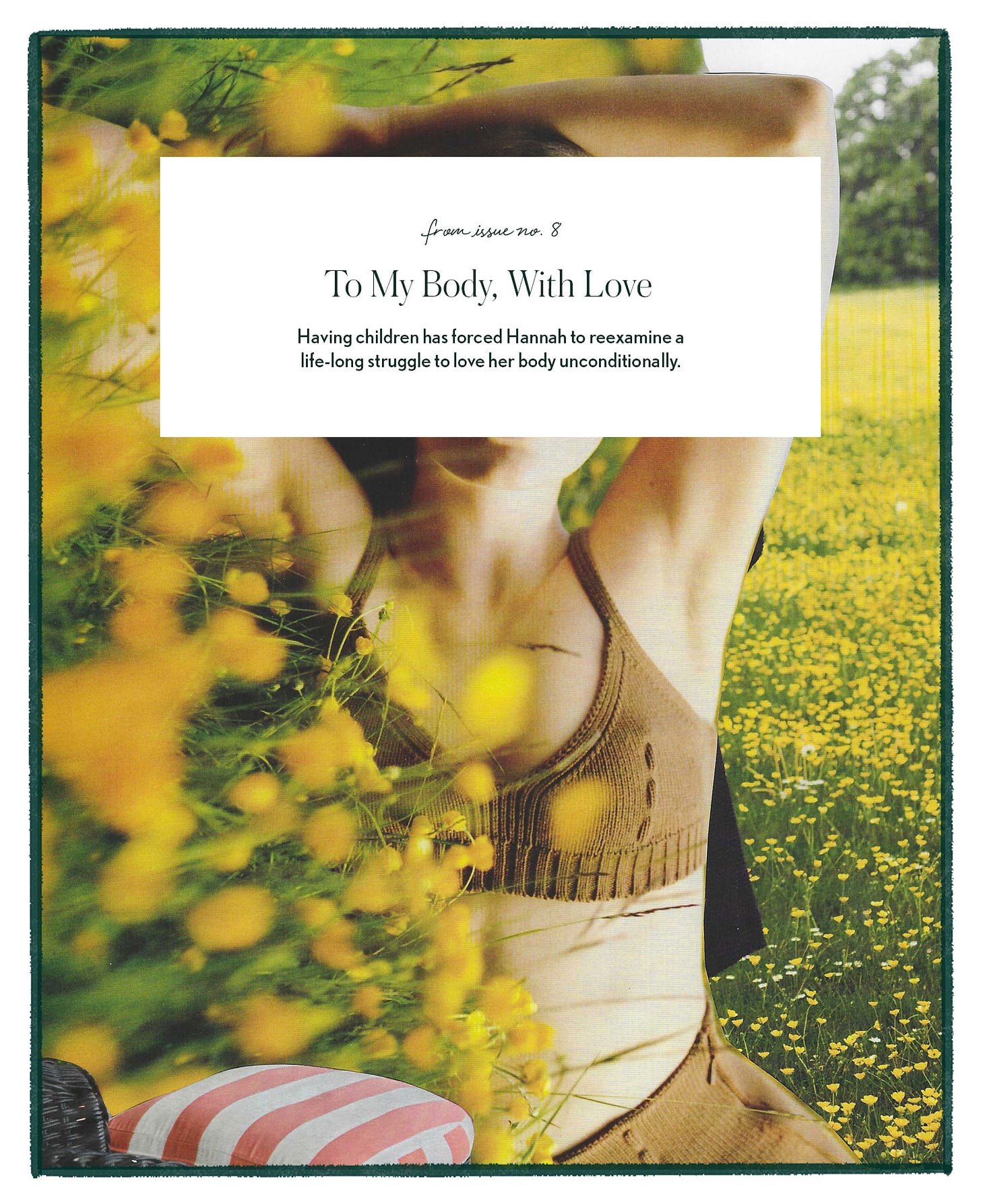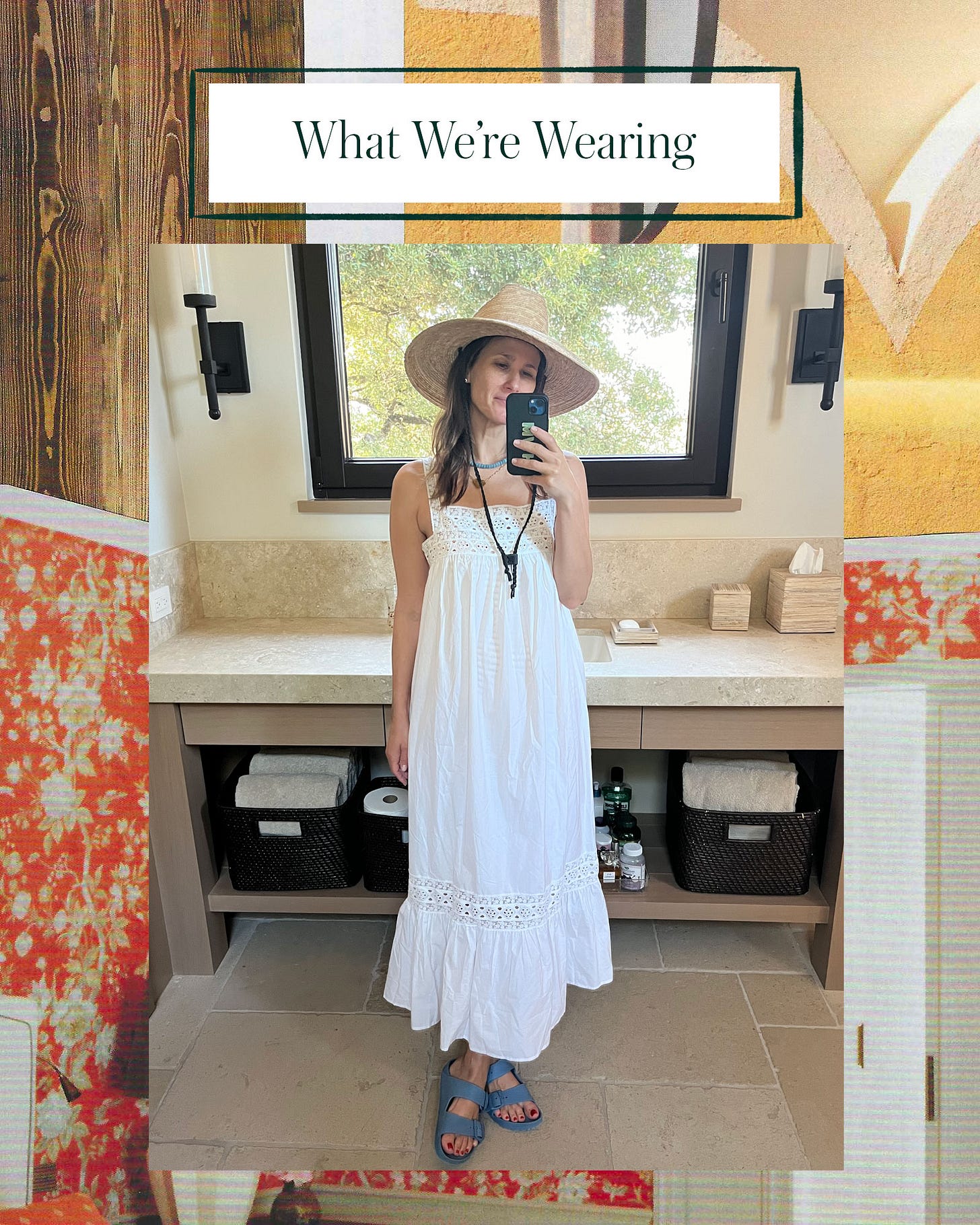Lydia Fenet on Why We Need to Think Bigger
Plus, a look at a special story from issue no. 8 of the magazine on loving and accepting our bodies for all the power they contain.
Every good conversation starts with a single question. Whether it's wondering how, why, or what, it's the place we jump off from—and into the moments where all the good stuff happens.
It’s why when we realized Lydia Fenet, a charity auctioneer nonpareil who spent the early part of her career at Christie’s, was preparing to celebrate the first anniversary of her eponymous auction agency (having already raised a massive $100 million for charities), we immediately thought of one big question to ask.
Leah: Congratulations on the birthday! I’m curious: What do you do after you start a business, and it’s humming along? There’s such adrenaline and excitement at launch when it’s all new, and you’re seeing the fruits of your labor come to life, but so much of the actual work is staying committed, thinking of how to expand and grow, persevering if things are less than rosy, etc.
Lydia: Without a doubt, the most important part that I've learned this first year is that I am a machine that keeps everything moving. In a world that is constantly looking for content, I need to constantly create content.
In my industry that’s being present on social media, doing a podcast; I’m finishing my third book. I am the machine that drives everything. If at any point I stop and look around and think we’re not getting as many requests as we need or I’m not doing XYZ, I have to look in the mirror and think, you're the person that makes this happen. That’s the difference between coming from a corporation where there are so many people and so many requests of you and your time to being an entrepreneur and making things happen.
The other thing is this the year has been so much about allowing enough space in what I’m doing for the inbound to come. When you start a business you have that belief that you’re going to jump in and it’s going to look like XYZ, and the reality is it doesn't. So many things are going to happen differently, and you’re going to have a lot more opportunities than if you follow down one road and think, this is what's going to happen.
I’m always interested in chatting with entrepreneurs about how they find something resembling a semblance of balance. It can seem like that word is ridiculous, but yet we all need to find a way to not just go full-steam on an idea. Personal life needs a space.
In Claim Your Confidence I talk about sprints and plateaus, and it’s come into play for me more than ever this year. My schedule can be nonstop, 24 hours, seven days a week, and as someone who's the breadwinner in our family and always looking for ways to bring in more revenue in different ways, I've had to learn about being selective about the things I do, to make sure my pricing is competitive.
At the end of the day, the more experience or seniority you have, the more ability you have to increase pricing and do fewer things for the same amount—or more and making more.
Summer for me is about taking my foot off the gas. For the month of July I don't take a single auction, because I really need that, or I feel like I'd burn out. This year more than ever people have asked me to, and I say, “I’m not available. I'll send another auctioneer.” This is my time off the stage, and I feel rejuvenated and rested. Because I have the time, my children feel that I’m present; it’s everything I wanted for this time of the year because I’ve been intentional about making sure I don’t burn out. If I did it at the rate I do nine months out of the year, I'm not sure I’d be alive. If I was on as many planes as the first two weeks of the year, it would have been a quick year for me
How do you keep yourself honest about taking those breaks? It can seem easy to say—“I won’t take projects under this rate or work on Fridays”—but then it’s not always that easy to stay true to what you said.
Look, if it’s going to completely and totally change things for me, then that’s worth it. I always say about auctions: If it’s an auction that there’s going to be another version of in August or September or October, the answer is no, because I can take that same auction in a different month. If it’s truly, in my opinion, something I can't say no to or career-wise it’d be a mistake to say no to, that’s a different thing.
You have to lead with your gut and know financially if it’s going to move the needle. If, from a business standpoint, it’s not going to move the meter, there’s probably another opportunity coming that’ll make up for the time.
It’s like that idea that if it’s not a hell yes, it’s a hell no.
Absolutely! I love saying “yes.” I've done it way too much in my life, but again, as an entrepreneur, it’s important to think about [whether] you making the most of your time. Are you getting, in an industry where you're paid for your time, are you getting paid enough? Is it worth your time? Is it worth the money that you are going to make to be in that place. Your time at that point might be better spent with your family or on your own or however you choose to spend that time, but what do you need to make it worth your time?
I was in Costa Rica for spring break, and because of the ups and downs of my year, I try to align the times I don't work—auctions or speaking engagements—for the big holidays for my children, and this year we had this amazing opportunity to be in Costa Rica for two weeks. I was like, this is incredible…and then I met someone in line in Delta, and he ended up working for a law firm that gave me the biggest speaking opportunity I've ever had, not only from an audience platform but monetary.
I sat with my husband for less than 10 seconds, and he said, “This is an obvious hell yes.” I would need to fly back and be on the plane for two full days, but it was a huge career opportunity. And if I’m totally honest, my kids didn’t even notice.
You have to give yourself the ability to carve that time out, otherwise set the plateau time: This is my family time, aside from a huge opportunity
How do you go about looking at what your hourly rate ought to be? I find so many women in our orbit are talking about this. It can be so hard to figure out what you should charge—and then once you figure it out, feeling comfortable with actually charging it.
Absolutely, on every single level.
When I first started charging for auctions I was so desperately afraid of asking anyone to pay me for my time—even though I’d done it for 11 years. I remember I asked, “Would you ever consider paying me $500 to take this auction?” and it wasn’t even a two- or three-second delay. It was, “Of course.”
I don't think I slept a week before I asked the question, and I definitely asked by email, and it was such an interesting thing to me. I think back to the 10 years of auctions I took for free and how much money I left on the table as a result of that. To this day it makes me internally cringe.
Every year, from that moment on, I look at my pricing and figure out what other auctioneers might be charging. Now it’s gotten to the point with my agency and in my own career where I do raise my rates every year. I know incrementally that I’ve gotten better; I probably have 10 to 15 years of experience on most charity auctioneers in the market. I’ve placed a premium on that experience.
If you have a business, look around and think about what your experience is and how you relate to everyone around you. If someone's been charging that, and you've been doing it for four years more, you should charge more. Do you have more experience or a social media following? Think about what you bring to the table, and don’t be afraid to go up. Tell them: “I am going to go up, and I'll go up in 2025 and 2026.” When people know that and to expect it, they aren’t surprised.
You can’t keep the rate the same every year simply because you're doing the same job—you’ve accumulated more experience. It’s such an important thing.
Hannah and I talk and think a lot about pricing for what we do, and I’ll never forget some of our community members telling us, “Oh, you guys definitely should have charged more.”
I found out that someone in the auction world who has probably taken 10 auctions is out-pricing me in his second year. I'd seen him take auctions. I knew what people were getting, and it was one of those wake-up calls. At some point you've got to just step into it.
For women it’s something we lack a lot—the confidence to step into it. “I am really good at this, and I know I’m good at this, and therefore my price is going to reflect that.” Instead of stepping into it, we think, I’m sure there's a lot of people good at it. It’s a great way to look at life, but in business you have to look at yourself amongst your competitors. The pricing reflects how good you think you are.
I remember one of my husband’s good friends—they’re almost like brothers to me and are obsessed with my business. They’ve loved it since day one. I got more notes from them when I went to start the agency because they were so excited.
I was at dinner with a bunch of them, and I fell back with one who asked how it was going. “Good, I have 85 auctions this year.” Everyone else would be like, “That’s amazing!” He was like “Dude, you need to charge more.” I was so offended. Like, what?
He said, “You gotta charge more. You have too much business. Raise your prices; you shouldn't be out 85 nights a year.” To me, that was the best of the best: No, you shouldn’t be out 85 nights a year. You should be out 60 nights, and raise your product because there’s demand. I was like 33, and I remember thinking, wow, what if I had a girlfriend say that to me five years ago?
Guys just say it, and if you hear it from the right person in the right circumstance, you’re like, right. I raised my prices the next season. I doubled my prices, and then it started to go up from there.
And doing things for free? I’m at a place in my career where I know I’m good at what I do. I can choose to discount it or waive the fee anytime I want, and I still do that for 10 auctions a year. That makes me feel great, and I feel great when I get on the stage, because I’m not on 85 a year. That’s an exciting byproduct: It gives you the time back so you can allot the extra time to things you're passionate about or if they don’t have the budget and I still want to be on that stage.
It’s like actors who talk about how they take the huge Marvel movie so they can sign on to an indie they’re passionate about.
Think about lawyers who donate their time to legal aid. If you're at the top of your game there’s an expectation that you're going to give back on some level. That’s just the American way.
As an entrepreneur you create the reality of your world, and you create the rules. The rules can change whenever you want them to. Don't be too hard and fast when opportunities you don't want to miss come your way, but take that down-time, because you need it.
People always say to me that, with women, one thing we don’t do enough is just think bigger than we do. I’d say when I started my agency, “That’s my dream.” I’ve had interns all summer doing outreach to nonprofits in the US, and recently I said, “You know, throw some in for Asia and Europe. Let’s see if we get any bites.”
This morning I got a call from London. This is the way it’s supposed to happen: Why am I thinking only of the U.S.?
Think global. Think bigger.
There’s something so fulfilling about wanting to fill a particular hole or need in your closet or house or makeup bag and then, finally, finding the just-right thing.
Stylish, long-line vests have been calling me, siren-like, every time I see some chic celebrity or Instagram-star wearing them. I held off until I found this denim option. It has the trending silhouette, but the denim makes it so much more “me.” I’ll wear it with jeans and midis (and might even try it layered over a dress). It’s crazy soft and with the darting and fitted cut, I opted for a size two.
After seeing my friend Madison from Fewer Finer wear this absolute showstopper of a necklace, I’ve had diamonds and colored stones on the brain. As ever, Dorsey’s lab-grown take fits more easily in my budget.
I’m super lazy when it comes to makeup, which means I need a dummy-proof brow situation. This pomade swipes on like a mascara, and it’s definitely something I’ll re-order when I run out of my first tube.
I used to own a white maxi with crochet trim that I loved and wore constantly only to sell it during a closet purge (RIP—I’m still thinking of you!). Hannah and I (and a few of you!) ordered this J.Crew style, and I’m planning on wearing mine on repeat for the rest of the summer. (Size down, and, yep, you’ll need a slip if you want to avoid sheerness.)
Every Zoom I take from my closet-office had me starring at my lampshade and wishing it was more…fun. When I spotted this bright option in the background of a snap of Riley Sheehey’s office, I immediately reached out to ask where it was from—and now we have friendship lampshades. x Leah
I thought about my body a lot this weekend. I wore a swimsuit and played with my kids and thought about the way my body looked. And then, I thought about how many of us might be preoccupied with the same thoughts, despite whatever else we’re doing.
It dawns on me that an Olympic athlete is taking to the internet to defend her body, and I love that she did—that she was outspoken and unapologetic—but it seems a strange thing to have to worry about or address at all, especially in the context of the Olympic games. I don’t see her male counterparts having the same conversations—the same need to publicly explain or account for their size.
And still, I get it. I get it so much. Sometimes, it’s all I can think about. And, when it has become overwhelming, I have thought about my body in the context of motherhood and the example I’m setting for two little girls. That’s exactly what inspired this piece from issue no. 8. (Subscribe now, and this is the issue that will be sent to you ahead of no. 9 in October.)
Sometimes, I think about my body after my first baby was born, and I cringe. I can see it when I close my eyes: lumpy and wide. Then, I think about how self-conscious I was in college, how I dreaded looking through photos of myself, and I cringe at that, too. On my best days, I try to see my body the way I see my daughters’. That they are beautiful, simply by virtue of being themselves. That they are perfect, not because they meet any standards of beauty, but because they inhabit their bodies fully and happily, unaware of what anyone else might deem “worthy.”
So, I wonder how I got it so wrong? I see it in my girls, but it’s harder to feel it in my bones, in my own body—in this body I’ve inhabited for 38 years, that has carried two pregnancies and birthed and nursed two healthy babies. I say it out loud, just so I can hear it: “That’s beautiful.”
It rings true when I say it. I look down at the way my stomach still slouches and rolls, and I think about how round it was and how much it stretched to hold the weight of my children. That it’s actually nothing short of miraculous the way that it opened up something inside of me, too—a greater capacity to appreciate and love and forgive myself, if only I tap into that.
It’s easy to forget when the mundanity of the everyday takes over, and you’re further and further from the profound experience of having your children. How strange to be overcome with the urge to get your jeans back on while laying there just a week out of the hospital? Even now, I don’t always look down at my C-section scar and think of my daughters; sometimes, it’s just an ugly mark without a story, if I let myself forget.
If I let myself forget that I know women who are fighting and have fought and lost battles to illness, I lose sight of what my body really is, how powerful it is. How it has not only cared for my children, but kept me healthy. That it is strong and capable—that I can walk and run and do push-ups and yoga. That I can hold my children and my husband and dance with them, because of this body.
But it’s odd to have to coach yourself. Not unlike the gratitude practice I’ve taken up, it requires conscious thought to pull me out of the comparisons and the negativity. If I’m honest, it is an almost daily practice. So, it is also a daily love letter—a daily homage to this body and what it can do. A daily thank-you note to her to say what I wish came more easily.
It’s the daily undoing of years of thinking—and it’s a funny thing to reconcile that, while my oldest celebrated her sixth birthday, I am still processing my own relationship to my postpartum, post-pregnancy body. That six years in, I’m still in it. Even as time seems to pass wildly, I’m here. With this.
The part that is automatic is the way I speak to my girls about their bodies—and the way I speak about mine in front of them. That kicked in almost instinctively as a reaction to my own insecurities. I want my daughters to feel so deeply connected to their bodies that they honor all the parts of themselves that I have not. That they know and appreciate how their bodies show up for them, and that they experience the beauty of their bodies in that way, daily and constantly. That their practice, what has taken me 30-plus years to get to, starts now, so that they might never know the other side of all this—that it’s never actually us against our bodies, but us inour bodies that fight for us and play with us and let us do and make and hug and hold. So how could that be anything other than beautiful?
Find more essays like this in print—subscribe to the magazine.
A dress so good, we both bought it to live out the rest of summer.
I started seeing this dress pop up all over Instagram on some of the most stylish women I follow, but convinced myself I didn’t need another casual summer dress. Then, it went on sale—a really really good sale—and it seemed silly not to. It’s a silhouette I love with pretty details at the neckline and skirt that make it feel special and slightly vintage. (I love it so much, I may have to follow Leah’s lead and get it in black to layer up with a chunky gray sweater and boots to style for fall.)
I wore it all weekend as a swimsuit cover-up with the accessories that have become the hallmarks of my summer uniform. These Birkenstocks are ridiculously comfortable and, dare I say, cute?! They’re playful and laid-back and the number one pair of shoes I throw on when I’m running out the door.
The hat is now my most-worn. It offers the shade I want and stays on when I’m chasing after my kids.
I love the way this blue beaded necklace looks layered with my Dorsey heart. Both are staples for jazzing up the necklines of almost every summer dress and blouse I own. xHannah










As a huge fan of Lydia's, I love hearing her speak to what drives her — and how we can get ourselves to ask for what we are worth. And, as I have just written about my own body image issue affiliated with what I am "lovingly" calling the #menopausefifteen, I am deeply moved by Hannah's writing here. xx